
|
Fellows’ Flyer |
|
March/April 2012 |
|
News and views for and by Princeton in Africa Fellows |
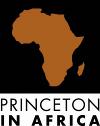

|
Niklas assisting in the GPS mapping |

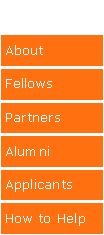

|
Get to Know Your Cocoa
Chocolate has an almost supernatural effect on many people. As that rich, smooth cocoa flavor melts in your mouth, endorphins flood your brain and you enter a state of bliss. For every person who exclaims they would “die without chocolate,” there are dozens of people for whom that hyperbole is true. Nearly 50 million people worldwide count on cocoa for their livelihood. Chocolate has a very different effect on these farmers and their families; instead of bliss, chocolate brings sweat, hardship, and vital income.
I’ve spent the last eight months working in the cocoa sector of Ghana, the world’s second largest producer after Cote d’Ivoire. Although cocoa exports contribute substantially to Ghana’s GDP, on an individual level, growing cocoa usually accompanies an impoverished life. I’ve met hundreds of farmers while working with Olam International, and all of them face similar challenges: lack of credit, lack of inputs and lack of knowledge.
The first two issues are linked to the low level of income provided by small-scale cocoa farming. Many farmers are among the poorest in Ghana, living on less than two dollars per day. However, the third issue—lacking the technical know-how to farm properly and efficiently—is even more tragic. Yet if farmers can find a way to address their lack of agricultural knowledge, they can and will remedy their other problems.
With Olam, I’ve been managing a project that takes the first step in bringing farmers knowledge to improve their cocoa farms and their income. With Olam’s Traceable Cocoa Project we have interviewed more than 9,000 farmers and have started mapping each farm using GPS devices. Through this process we are learning extensively about the successes and challenges of these farmers and their communities. Armed with this knowledge, Olam can more effectively improve community infrastructure (water sources, school improvements, etc.) and farmer livelihoods (through training programs on proper agricultural practices).
In addition to improving farmer yield and income, another goal of the project is to produce a website that consumers can use to understand where their chocolate comes from. Our hope is to put a code on each bar of Olam-supplied chocolate so consumers can go online and learn a bit about the farmer who produced the cocoa and see on an interactive map where it was grown.
This service of bridging the gap between producer and consumer will likely only be available for specialty chocolates (i.e. products certified by a third party as “sustainable,” “fair trade,” or “organic”). Socially-conscious chocolate lovers will be more connected to their food and they can take comfort in the fact that paying a little more for chocolate is a small, but significant way to make a difference. Not only do farmers receive higher prices for cocoa used in specialty products, but their community benefits as well.
So next time you savor some delectable dark chocolate (or, more realistically, gobble it all down in one breath), pause for a moment to think about the men and women who labored to grow it, cut it, ferment it, and carry it to market. For you it is just another tasty treat, but for them it is how they feed their family and send their children to school. |
|
Amanda fetching rainwater |
|
Amanda taking a rainwater survey in the village |
|
Niklas with his current team that is doing GPS mapping of the farms |
|
Tel: 609.258.7215 Fax: 609.964.1818 piaf@princeton.edu |
|
Mailing address: Post Office Box 226, Princeton, NJ 08542 Street address: 194 Nassau Street, Suite 219, Princeton, NJ 08542 |
|
Janelle with the South Africa based Nexii team |

|
I’ll be honest with you. I had no specific interest in working in Africa when I walked into the office of Princeton in Africa looking for a placement. My work at Princeton University was focused on the Program in Sustainable Energy and I wanted any experience I could get in this field, especially in a developing country context, being from Trinidad. Graduating from Princeton debt free (yay Financial Aid!), I also didn’t mind volunteering and I loved the opportunity to travel. Princeton in Africa gave me a surprisingly ideal placement. In August, I began work in the Sustainability Department at Nyumbani Village, an orphan village that houses one thousand HIV-orphaned children along with their grandparents, aka su-sus. Located on one thousand acres of land in the rural Eastern Province of Kenya with the ambitious goal of being self-sustainable by 2018, this place is oozing sustainability from every corner as the clock ticks down on funding from USAID, its main sponsor.
With the generous help and support of Johnson&Johnson, my fellowship is funding a rainwater harvesting and filtration project in the village. I’m in charge of managing the installation of over one hundred rainwater tanks on the houses in the village, testing and selecting an appropriate rainwater filtration system, and teaching the children in the village about water hygiene and conservation. This sounds pretty straightforward until you spend some time in the village and realize how foreign a concept large-scale rainwater harvesting is to the residents. Luckily my placement is long enough to observe and question the villagers and tailor my classes to suit their needs. Who would have thought that I needed to explain to the su-sus that a tank lid should not be removed from the tank and used as a basin for bathing? (how did that su-su get on top of the tank is another issue altogether); or that the cleaning brush for the water filter should not be used as a weapon to kill a snake? I know they say Africans are resourceful but this is a whole next level in my village!
My placement has opened doors to so many unexpected opportunities in the field of sustainability and taught me so much, consciously and unconsciously. Living in an area where one’s food, job and even access to education depends on whether the rains come or not has demonstrated to me the realities of living in a harsh climate and how vulnerable such people are to the effects of a changing climate and rainfall pattern. Nyumbani Village has also shown me how surprisingly resilient, motivated and hard working the orphans are. For example, the secondary school students spend 13 hours a day at school, only to return home in the dark to cook dinner and wash their clothes in preparation for the next day. Their only goal is to progress to a higher education and everyday they are an inspiration to me. With all the opportunities, highly motivated people and new lessons to be learned in sustainability and elsewhere, Nyumbani village makes it easy to forget the lack of running water, electricity and Internet. I have to admit though, I’m still working on absorbing the fact that by the end of my placement I will eat about 5 times my weight in maize and beans! |
|
By Anne Stotler ‘11-’12 Fellow at Save the Children, Ethiopia |
|
Notes From The Field |
|
Highlights from 2011-2012 Fellows: Shelia Agiti in South Africa, Janelle Morris in South Africa, Niklas Peters in Ghana, Amanda Ramcharan in Kenya and Anne Stotler in Ethiopia |
|
Janelle at Devil’s Peak with Fellow Jessica Annis |
|
Notes from the Field |
|
By Amanda Ramcharan, ‘11-’12 Fellow at Nyumbani Village, Kenya |
|
Anne celebrating Ethiopian New Year in traditional garb with her supervisor, Carol, and Carol's kids Kalkidan, Hiwot, and Wobfire. |

|
News from the PiAf Office: —PiAf 2012 Nairobi Retreat —PiAf Connections: Nairobi Retreat, Kili Climb & Princeton
|
|
Nairobi retreat |

|
Nine Fellows with Program Manager Stephanie Hooper & fiancé Scott Leroy during their trek up Mt. Kilimanjaro in March |
|
PiAf Connections: Nairobi retreat, kili climb & Princeton |
|
PiAf Staff Stephanie Hooper, Katie Henneman, Liz Thurber & Intern Ryan Fauber enjoyed Amanda Ramcharan’s visit to the offfce |
|
16 Fellows gathered in Nairobi for the Princeton in Africa retreat led by Program Manager, Stephanie Hooper |
|
Christine Bohne, Molly Schmalzbach, Mark Adams and Alec Jahncke during the retreat in Nairobi |
|
Rachel Quint, Elly Sukup, Julie Kornfeld, Emily Trautner, Leah Haynesworth |
|
Anne laughing with Bamadio, the coordinator of Save the Children's research in Sikasso, Mali. |

|
Notes from the Field |
|
By Janelle Morris, ‘11-’12 Fellow at Nexii, South Africa |
|
When I arrived in Addis Ababa, I never would have imagined that nine months later, I’d be writing this Fellows Flyer not from Ethiopia, but from Zambia. In fact, while I was thrilled about being selected as a Princeton in Africa fellow, I really didn’t know what to expect from this year. Nine months later, I am amazed at all that I have experienced and learned.
As a Princeton in Africa fellow at Save the Children’s Africa Area Office in Addis Ababa, Ethiopia, I am coordinating a qualitative research project investigating the living situation of children living in urban areas across Africa. This project has taken me to six counties – Malawi, South Africa, Mali, Ethiopia, Tanzania, and finally Zambia – where I’ve gotten to work with local research teams and communities. Ultimately the findings of this research will affect Save the Children’s strategy for programming in urban areas – where the majority of Africa’s children will live in the near future – so it’s really exciting to consider the impact our work could have.
Along the way, I’ve dealt with unexpected challenges – from “emergency” community meetings getting in the way of our interviews, to fending off aggressive men while traveling alone, to puppies vomiting in my suitcase (never thought I’d have to worry about that) – but I’ve encountered many more unexpected joys. I’ve been handed a tremendous amount of responsibility at work and been involved in every aspect of a research project that has the potential to change the way a major international NGO operates. I’ve worked with dynamic and diverse local teams in countries across Africa. I’ve experienced a new and fascinating culture that I knew almost nothing about before I arrived in Ethiopia. I’ve gained friends from all over the world, and benefited from the friendship and support of PiAf fellows in Addis and beyond. I’ve formed a close relationship with three Ethiopian children, who I lived with for my first eight months in Addis and who have taught me far more about living life to the fullest than I could possibly have taught them in the months I’ve been helping them with homework.
If you had told me nine months ago that I’d lead a training in front of a group of strangers, I would never have believed you – I’ve never been very comfortable speaking in front of crowds. Yet just last week I facilitated a training on Participatory Rapid Appraisal techniques for staff from Save the Children’s Zambia country office. Over the past nine months I have constantly been challenged to step up and take on more responsibility than I thought I was comfortable with, and I have gained so much confidence from knowing that I took that step. I can’t say that this experience has answered the questions I had about what I want to do with the rest of my life – but instead, it has taught me that its okay not to have my whole life mapped out just yet. As long as I keep challenging myself and taking chances, I know that I’ll end up in the right place eventually.
As I look forward to the end of my fellowship and the next step of my career, I realize that my horizons have been dramatically expanded by this experience. I don’t know where I’ll be five years or even six months from now, but I do know that wherever I end up, it will be thanks to my Princeton in Africa experience that I’m there. |
|
Sheila at a community service project that works with beneficiaries to grow food on a common piece of land |

|
Johannesburg, South Africa (July 2011 to date): 29th July, 2011. After a 15 hour direct flight (with no sleep the entire time), I arrived in Joburg tired but excited. I was about to start my first job. Not just any job but one that combined my passion for the African continent and my interest in education. I took in the sight of my new home. 30 minutes later, I was being introduced to several people. This marked my first day on the job. I should have known from this hectic first day that my life at African Leadership Academy would be action packed. Cape Town, South Africa (January 2009- June 2010, August 2011) My first assignment was to support the Leadership & Entrepreneurship faculty in running a 3 week summer camp that aimed at immersing young students in leadership and entrepreneurship lessons. I headed to Cape Town when it ended. This was by no means a vacation. My social calendar was packed. Between meeting old friends from University of Cape Town and new Princeton in Africa fellows, I had little time to myself. But this was a worthy trip because I journeyed back to the place that nurtured my love for South Africa. I physically left in June 2010 but South Africa definitely stayed with me. I vowed to explore more of the country and its environs this time as well. Durban, South Africa (October 2011) Next off, I went to Durban. I was impressed at the effort the city officials had made to encourage green behavior. Streets were kept tidy with lots of trees around. I discovered somewhat too late that Durbanites love to walk. Our host offered to give us a tour of the city. First location was city center which was “just over there.” An hour later, we were still walking. My feet were sore but I appreciate this lesson. Doing the right thing is not always an easy thing. Mbabane, Swaziland (November 2012) Swaziland was beautiful. It had the feeling of strong sense of community. It had a good blend of comfort and culture. I am used to extremes but Swaziland taught me a blend of cultures is possible. In fact it exists. Tema, Ghana (December 2011) This whole time, I was very focused on my work at ALA and the only “vacations” I had were the long drives to other cities. Arriving in Ghana, my home country, was a different experience though. I was no longer a tourist so I had to think of something other than my beautiful surroundings. My mind went to work: What would Ghana look like if we had the caliber of leaders ALA is training? How can I use what I have observed at ALA for the benefit of my country? Do Ghanaians believe in community service? What is happening to me? This was supposed to be a relaxing time with my family but looks like my experience with ALA and my travels were challenging me to do something. Having this amazing opportunity through Princeton in Africa was not the end. My actions in the future will be a testament to how instrumental this experience has been. Stay tuned! |
|
By Sheila Agiti ‘11-’12 Fellow at African Leadership Academy, South Africa |
|
Notes From The Field |
|
Sheila zip lining in Swaziland |
|
On February 27th, sixteen 2011-12 Princeton in Africa Fellows converged on Nairobi from across the continent, coming from as far away as South Africa and Zambia. The ‘11-‘12 Fellows were joined by two PiAf alumnae and PiAf program manager Stephanie Hooper for a few days of community, reflection and downright fun. Mark Adams, the PiAf Fellow at Kucetekela Foundation, also in Zambia, says of the retreat, “Spending those days together discussing the highs and lows of our individual experiences, and identifying what exactly we’re taking away from them, quickly created strong bonds.”
|

|
Occupy Impact 100%: Nexii and the New Wall Street
There has been much discussion around the perception that our economy is fundamentally shifting from a bifurcated world, in which profit-maximizing and non-profit models are separate, to a world in which pioneers are taking a blended approach. By building for-profit enterprises and adapting systems where value is defined as not only economic but also inclusive of social and environmental impact, new business models are changing the way we view the business landscape. Nine months ago, when I started as a Princeton in Africa fellow with Nexii in South Africa, I might have said that this vision of the world is too idealistic, using jargon like “social enterprise,” “impact investing,” “market-based solutions” and “triple bottom line.” However, my experience with Nexii has completely convinced me that we are entering a new era, comprised of innovative businesses and socially-oriented entrepreneurs seeking economic returns as well as sustainable impact. Call me naïve, but I do believe a rapidly emerging field called impact investing, in which economic and financial return also creates social and environmental return, is poised to change the world. Nexii is a social enterprise working to facilitate the flow of capital toward high impact initiatives through building the financial infrastructure to make these types of investment opportunities possible. We have launched the world’s first publicly regulated social stock exchange, the Impact Exchange Board (iX), dedicated to social enterprises and impact investors. My role as part of the business development team consists of talking with social entrepreneurs about their work and how our investment platforms can help them raise capital to achieve scale and maximize impact. In addition to working on the platforms, I have had incredible opportunities to work on a range of projects, including traveling to Bolivia, Peru, and Colombia to work on a risk-capital platform for equity-based investment in rural small and medium enterprises (SMEs); helping to design a social impact bond mechanism for increasing the efficiency of courts and decreasing recidivism rates in South Africa; and analyzing the barriers limiting access to affordable finance for SMEs in South Africa. Nexii is pioneering how to harness capital markets to do well by doing good. We are attempting to re-define capitalism and intermediating where we can to shape markets and make new rules that benefit all of society. Princeton in Africa has offered me the opportunity to discover and experience this new era of transformation and for that, I am forever grateful. |
|
Notes from the Field |
|
By Niklas Peters ‘11-’12 Fellow at Olam International, Ghana |
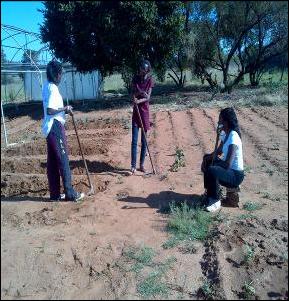
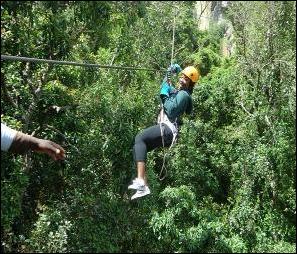
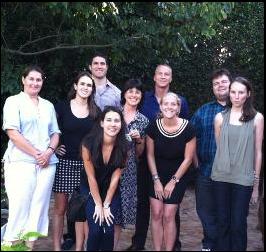
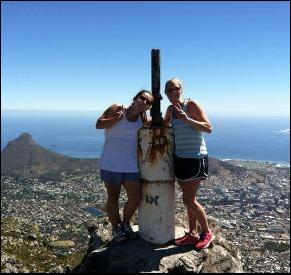
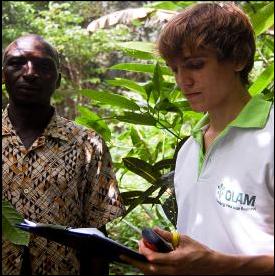
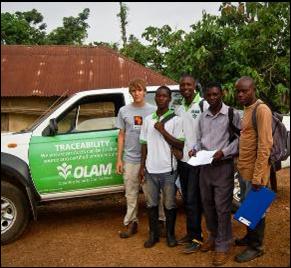
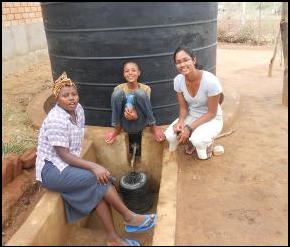
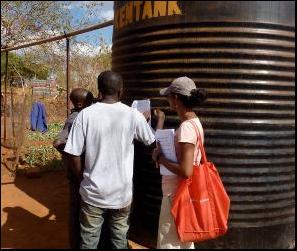
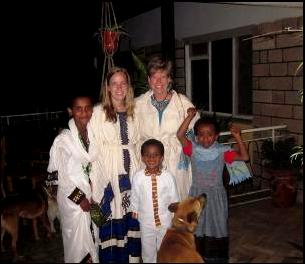
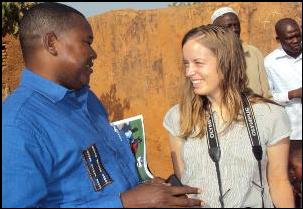





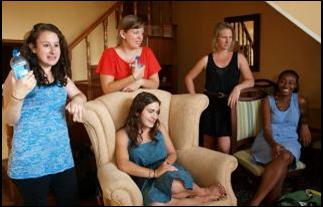
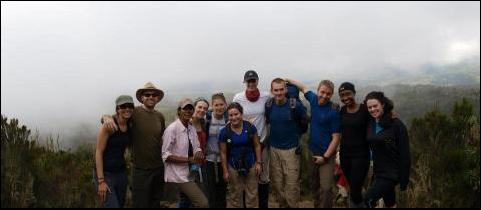
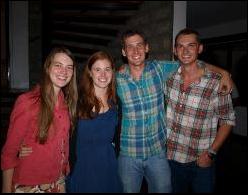
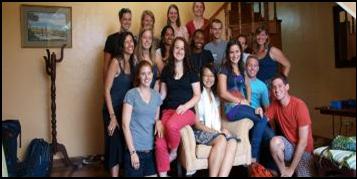

|
Greetings from the Piaf office! |
|
Princeton in Africa is excited to report about new developments underway at the office in Princeton.
Katie Henneman started as the new PiAf Executive Director in mid-March of 2012. She brings over a decade of nonprofit management, development, and international program experience. Like many of our fellows, Katie first fell in love with Africa while studying abroad at the University of Cape Town, and has enjoyed her more limited opportunities for personal and professional travel to the continent ever since. Katie’s first impressions of PiAf: “After only a few weeks working with Princeton in Africa, I am already amazed at the hard work, intelligence, humor, diversity, and sheer vibrancy of the PiAf Fellows. I am honored to be working for an organization that has such a strong commitment to Africa and to the development of young leaders.” Katie looks forward to welcoming a new batch of Fellows in May, engaging with current and past Fellows, and learning more about PiAf’s partner organizations in the months ahead.
Liz Thurber was appointed as Program and External Affairs Assistant after working with PiAf on a short term contract that began last fall. Liz graduated from Bucknell University in 2010 with a dual degree in Sociology and Economics. Following her graduation she worked for Community Enterprise Solutions on their social entrepreneurship initiatives in Ecuador. Liz is thrilled to be part of the PiAf team. "It's a great honor to support the vital work of PiAf in developing young leaders who are committed to Africa's advancement. Our Fellows do extraordinary work with their partner organizations, and our alumni represent a vital resource for continuing service and policy development. I look forward to finding new ways to share your inspiring stories and to generate additional support from our friends and donors." |
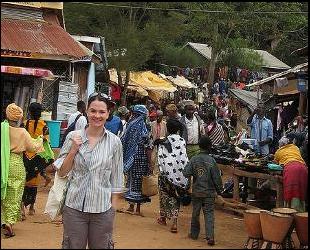
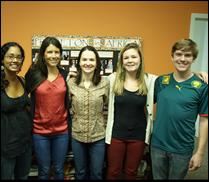
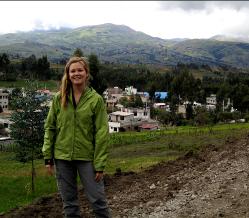
|
Katie enjoyed the hustle and bustle of the Lushoto market in the Usambara Mountains of Tanzania. |
|
Liz enjoying a hike outside of Riobamba, Ecuador |
|
Anne and PiAf Fellow Rachel Quint take a break from hiking to enjoy the incredible views in the Simien Mountains in northern Ethiopia. |
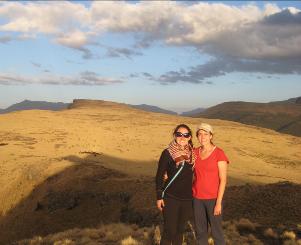
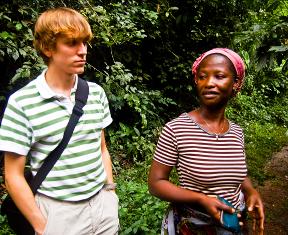
|
Niklas and a team member |
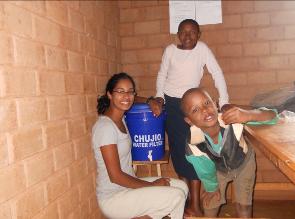
|
Testing out the new water filter |
|
For more photos of Stephanie’s Africa travels see our album on Facebook |